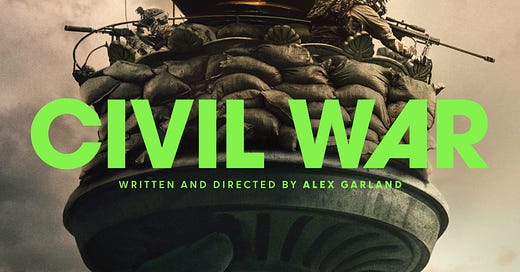Alex Garland's 'Civil War' is a technically masterful exercise, but...
I'm not certain that it's the best possible movie with this particular premise
When the trailer arrived earlier this year for Civil War, director Alex Garland’s latest film, there was a great deal of befuddlement over, for instance, why it appeared that California and Texas were allied in this version of reality.
Now that the film has arrived, it’s clear that the ideological alignment between the characters and the movie itself is one of its least important aspects.
The British director Garland’s film is set in a not-to-distant future in which the United States has fallen into yes, a civil war. The conflict is presented with little political specificity, except that we know the president is doing repressive and violent things and that the opposite side of the war is willing to get pretty violent themselves.
Should the film have made the president into a neofascist Trump stand-in and his opponents into insufferable snowflake elites? No! Because that’s what just about every Hollywood-produced political film of the last decade has done, and just about none of those films was any good. It also stages an attack on Washington that doesn’t look or feel anything like January 6, placing it at night and on the White House instead of the Capitol.
That said, while there’s a ton here that Garland does right, I’m not entirely convinced that the story he chose to tell is the most intriguing one that could possibly arise from an actual American civil war.
If I could envision Alex Garland making a ten-part anthology series based on different aspects of a near-future American Civil War, I could imagine this being the third or fourth-best episode.
The one time Garland did make a TV series was the fantastic, pandemic-era sci-fi Hulu mini-series Devs, and here he’s imported most of the cast, including Nick Offerman, who appears in a small part as the president of the United States.
Most of the characters are journalists on a road trip together from New York to Washington, hoping to interview the president as a coup envelopes Washington.
Kirsten Dunst does some of her best work ever as Lee, a veteran war photographer who’s traumatized by the things she’s seen throughout her career. Wagner Moura plays a fellow successful photographer, and while joining them is Sammy (Stephen McKinley Henderson), an older journalist who acted as a mentor to the other two. Joining them is Jessie (Cailee Spaeny), a young photographer with a huge daredevil streak. For reasons not so adequately explained, cell phones don’t work, and the characters only use old, antiquated cameras.
It’s mostly a road movie, as the group comes across harrowing, often surprising dangers. There are varying tableaus and plenty of surprising violence, and it feels earned when characters die. Possibly the scariest scene is a brief one with Jesse Plemons (husband of Dunst) as a soldier; he often plays the goofball, but Plemons is great at playing psychos, too.
Garland is a fantastic visual filmmaker, as anyone who has seen his best film, Annihilation, can attest (let’s not talk about Men, his misbegotten 2022 film.) And the third act here, which depicts an attempted coup in Washington, D.C., is virtuoso filmmaking all the way through.
The film also highlights the work done by wartime photographers while clarifying that the photographers themselves are human beings who don’t need canonization.
Civil War arrives on the heels of a controversy involving the Israel/Hamas war, in which a team covering the October 7 attacks received a “Picture of the Year” award. Judging by certain Facebook groups I’m in, many appear under the impression that photography awards are presented with the implication that the things that happened in the pictures were good and that they agree with it. Hopefully, some people will see this movie and have it disabuse them of that notion.
My only big complaint about Garland’s Civil War? I just found myself wishing for more backstory about how the war started and how it got to the point it had at the start of the movie’s events. I’m not saying it needed to be an ideological screed, but I can’t shake the feeling that some of those stories might have been more interesting than the one we got.




